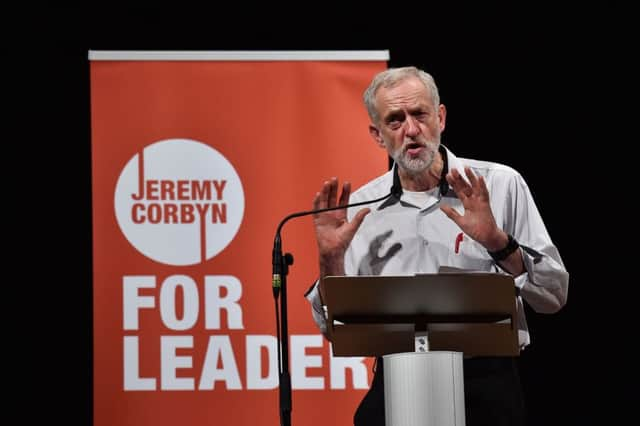Allan Massie: Unionists can prevent SNP Government


WE HAVE all read the opinion polls which tell us to expect a large and very comfortable SNP majority in the next Scottish Parliament. Some find this extraordinary because they think that in many respects the SNP’s record in government is pretty poor, but it seems that a great many voters are either satisfied with it, or simply don’t care about the performance of the present Scottish Government. Either way, the opinion polls leave the three Unionist parties “bewitched, bothered and bewildered”, as a popular song of my youth had it.
Labour are certainly in that condition, partly of course because the UK Labour Party is in a very strange state, some bewitched by Jeremy Corbyn’s campaign, others bothered by it, and even some of Corbyn’s supporters bewildered, I suspect, by his sudden popularity. There was a very interesting article published this week on The Spectator’s Coffee House site. The author, Robert McGregor, a Labour activist who campaigned for a No vote in the referendum, argued that Corbyn’s old-style Socialist revivalism was generating an enthusiasm among traditional Labour voters such as hasn’t been seen for a long time. “Corbyn,” he wrote, “has the same kind of magic which turned so many Scots to the nationalists at the last election.” He can fill a hall in Glasgow quicker than Nicola Sturgeon, and Mr McGregor reckons that “Corbynism” should have Ms Sturgeon and the SNP worried.
Advertisement
Hide AdAdvertisement
Hide AdWell, maybe. Corbyn may not be elected Labour leader, and meanwhile we have a new Scottish Labour leader, Kezia Dugdale, whose harrying of Nicola Sturgeon at Holyrood was highly praised by Brian Wilson in these columns last Saturday. She doesn’t appear to have much in common with Corbyn.


On the contrary, her practical commonsense approach to political questions seems reminiscent of the Scottish Labour leaders of the 1980s who helped keep UK Labour on an even keel, and were resolute in their opposition both to Margaret Thatcher and to the likes of Tony Benn and the Militant Tendency, the Corbynites of their day. So Ms Dugdale is going to have to perform the difficult circus act of riding two horses at the same time. She will have to draw on any renewed enthusiasm for her party that Jeremy Corbyn may have inspired. She must also present herself as a credible First Minister capable of appealing to the middle-class salariate and professionals who helped to give Labour their Scottish majorities for more than a quarter of a century. She has to appeal to the people who not long ago gave huge parliamentary majorities to politicians such as Douglas Alexander and Jim Murphy, as well as to constituencies where, as we used to say, any donkey wearing a red rosette was sure of election. Uphill work indeed. Nevertheless a Labour recovery is the first requirement if the SNP is to be denied a majority at Holyrood.
What of the other unionist parties? What of the Tories and the Liberal Democrats? Any unionist must be aware that unionist divisions make things easy for the SNP.
A house divided does not stand securely. Unionists took 55 per cent of the vote in the referendum, but won only three of Scotland’s 59 Westminster seats last May. This would be astonishing if there was a single unionist party in opposition to the SNP, but since there are three unionist parties and one Nationalist one, it isn’t astonishing at all.
Ruth Davidson, the Scottish Tory leader, gets a good press and seems to be widely liked and respected. Yet her party doesn’t benefit. She doesn’t win them seats.
Willie Rennie is a competent and respectable Liberal leader at Holyrood, but the Liberal Democrats suffered electoral disaster in May. Ms Davidson and Mr Rennie are committed to the union, and it is not easy to see what divides them. Yet their parties campaign against each other, and the beneficiary is the SNP, which wins seats because the unionist vote is split.
Many unionists who don’t belong to any party find this ridiculous and infuriating. Many who are party members, or, if not members, nevertheless habitually vote for one or other of the three unionist parties, must also recognise that division opens the door to the SNP.
We should recognise that the union remains the single most important issue in Scottish politics, far more important than anything else. The SNP is clear about this; the unionist parties aren’t; or, if they are, they don’t behave as if it is. It is surely time they did.
Advertisement
Hide AdAdvertisement
Hide AdVery little really divides the Scottish Tories and Liberal Democrats, and many recognise that the Coalition government worked pretty well for five years. They should act on this recognition. An electoral pact which would see the Tories standing aside to give the Lib Dems a clear run in some constituencies, and Lib Dem candidates making way for Tory ones in other seats, makes obvious sense. Clearly not all votes would transfer, but enough would probably do so to defeat the SNP candidate in a fair number of constituencies. People would still be able to give their List vote to the party they preferred.
What of Labour and the other unionist parties? It would be unrealistic for the Tories to propose any electoral pact with Labour. Any offer would be refused and would probably be seen as cynical. Nevertheless, it would make sense for the Tories – and even more so for the Liberal Democrats – to step aside in a number of constituencies where they haven’t the slightest chance of winning. The fact is that neither can pretend at present to be a national party – that is, a party capable of mounting a credible challenge in all parts of the country.
No doubt the tiny minority of Tory and Lib Dem voters in Glasgow and Lanarkshire would feel deserted and aggrieved, but they again would still be able to cast their List vote for the party they support. After all, the only MSPs the Tories and Liberal Democrats can hope to have from Glasgow and west-central Scotland are List ones.
Realism can be painful. Yet any realistic unionist must recognise that finding a way of checking the SNP by preventing the election of another majority SNP government is by far the most important political question in Scotland today. Realism suggests that this can’t be done if the unionist parties seek to cut each other’s throat. Unionist division means SNP victory; it’s as simple as that.